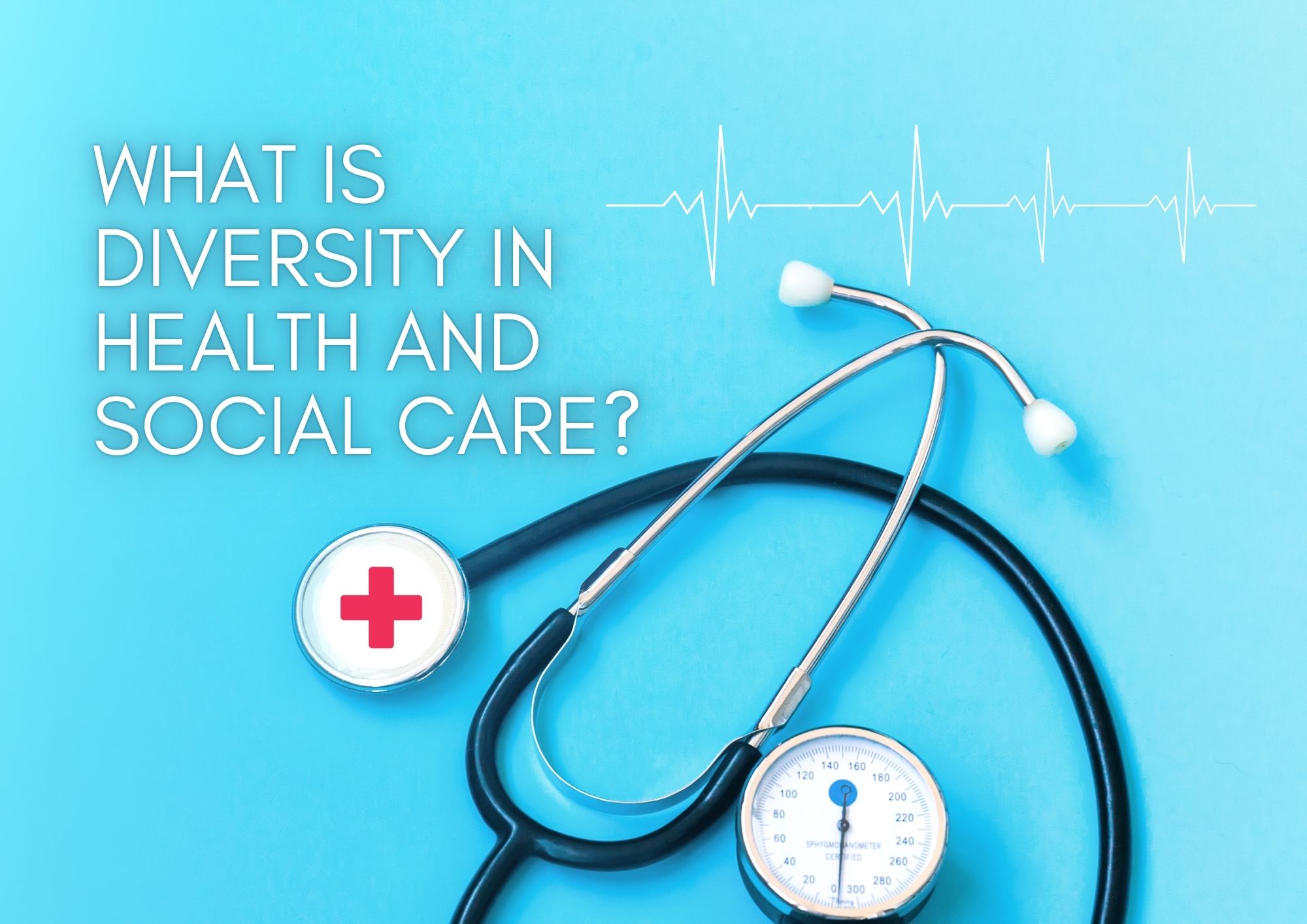Introduction
Diversity in health and social care is essential to guaranteeing that each person is treated fairly, equally, and inclusively. Differences in sexual orientation, financial class, gender, age, race, ethnicity, handicap, and religion are all recognized and valued in this notion. It creates a setting where medical care is friendly, available, and customized to each person’s unique requirements.
It is impossible to overestimate the significance of diversity in healthcare. Better communication, better patient outcomes, and a more welcoming workplace for healthcare workers are all results of healthcare providers embracing diversity. What diversity means in health and social care, how it affects the workplace, and how it relates to inclusion, equality, and discrimination will all be covered in this article.
What is Diversity in Health and Social Care?
Diversity in health and social care refers to recognizing, respecting, and valuing the unique characteristics and backgrounds of both patients and healthcare providers. It guarantees that care services are fair, considerate of cultural differences, and customized to meet the requirements of each individual.
An inclusive healthcare system guarantees:
- Cultural Competence: Healthcare workers receive training on how to appreciate and comprehend various cultural customs and beliefs.
- Equal Access: Regardless of their gender, color, or origin, patients receive medical attention as well as social support.
- Personalized Care: Medical plans are created to meet the specific medical and cultural requirements of every patient.
- Improved Communication: Multilingual employees and interpretation services aid in removing language barriers.
A lack of diversity in healthcare can lead to inequalities in treatment, miscommunication, and reduced trust between patients and providers.
Diversity in the Workplace: What It Means in Health and Social Care
Diversity in healthcare settings means having a workforce that represents the wide variety of identities, ethnicities, and viewpoints that exist in society. A diverse workforce promotes creativity, enhances teamwork, and improves patient care.
Benefits of Diversity in the Healthcare Workplace:
- Better Patient Care: By addressing the unique requirements of a multicultural patient group, a diverse workforce can lessen prejudices and raise patient satisfaction.
- Enhanced Innovation: Diverse viewpoints and backgrounds inspire fresh concepts and innovative approaches to patient care and medical treatments.
- Improved Communication: A varied staff helps patients and healthcare providers communicate more effectively by lowering linguistic and cultural barriers.
- Legal Compliance: To guarantee equitable chances for all employees, healthcare organizations must abide by anti-discrimination and diversity regulations.
Employers should actively promote diversity through inclusive hiring practices, diversity training, and equal access to career growth opportunities.
Examples of Diversity in Health and Social Care
Healthcare institutions implement diversity in various ways to create an inclusive and supportive environment. Some common examples include:
- supplying multilingual support personnel to help patients who don’t speak English.
- providing meal options in nursing homes and hospitals that are suitable for the local culture.
- establishing wheelchair-accessible spaces to provide accessibility for those with impairments.
- promoting inclusivity in healthcare facilities by commemorating many religious and cultural holidays.
- To guarantee sensitivity to diverse backgrounds and customs, staff members should get cultural competency training.
By integrating these diversity initiatives, healthcare providers can offer more compassionate, inclusive, and effective care to all patients.
What is Inclusion in Health and Social Care?
The goal of inclusion in health and social care is to establish a setting where everyone is respected, feels appreciated, and is empowered to take part in their own healthcare choices. All people, regardless of their identity, background, or health condition, can receive healthcare services thanks to inclusion.
Key Aspects of Inclusion:
- promoting involvement of many groups in the decision-making process for healthcare.
- allowing for appropriate modifications to meet various needs, such as accessible appointment scheduling platforms for individuals with disabilities.
- getting rid of obstacles like discriminatory practices and financial limitations that stand in the way of equal access to healthcare.
By fostering inclusion, healthcare organizations can ensure all individuals receive fair, equitable, and personalized care.
What is Diversity in Health Care?
Diversity in health care extends beyond patient demographics and includes the diversity of healthcare professionals, treatment approaches, and healthcare policies.
How Diversity Benefits Health Care:
- Better Patient Outcomes: Culturally competent care leads to more effective treatments and better health outcomes.
- Reduction in Health Disparities: Addressing healthcare inequalities ensures all communities receive appropriate medical support.
- Stronger Workforce: Diverse healthcare teams provide varied expertise, skills, and insights, leading to better teamwork and decision-making.
Diversity strengthens the overall quality, accessibility, and inclusivity of healthcare services.
What is Equality in Health and Social Care?
Equality in health and social care means ensuring that every individual receives the same quality of care, regardless of their personal characteristics.
Key Principles of Equality:
- Fair treatment: Patients ought to get care free from prejudice or bias.
- Equal access: Regardless of location or financial situation, everyone should be able to obtain healthcare.
- Support for vulnerable groups: Healthcare professionals need to take into account the special requirements of older patients, people with disabilities, and members of underrepresented groups.
Promoting equality helps create a just, fair, and inclusive healthcare system.
What is Discrimination in Health and Social Care?
Discrimination happens when someone are treated unfairly because of their age, gender, race, or disability. It may have an impact on patients’ overall healthcare experience and the standard of care they receive.
Types of Discrimination in Health and Social Care:
- Direct Discrimination: When a person is treated unfairly because of a specific characteristic.
- Indirect Discrimination: When a rule or policy applies to everyone but disadvantages a specific group.
- Harassment: Unwanted behavior that creates a hostile or offensive healthcare environment.
- Victimization: Punishing someone for making a complaint about discrimination.
By raising awareness and enforcing anti-discrimination policies, healthcare providers can ensure a respectful and supportive environment for all patients and staff.
Examples of Equality in Health and Social Care
Healthcare organizations promote equality by implementing inclusive policies and practices, such as:
- Offering financial assistance programs to ensure low-income patients receive necessary care.
- Providing gender-neutral restrooms in medical facilities.
- Ensuring fair hiring and promotion opportunities for healthcare professionals from diverse backgrounds.
- Conducting regular diversity and inclusion training for staff members.
These initiatives help create an equitable and inclusive healthcare system for all individuals.
Conclusion
Providing equitable, compassionate, and high-quality healthcare services requires diversity, inclusion, and equality in the health and social care sectors. Healthcare companies can foster an inclusive atmosphere where patients receive optimal care by guaranteeing cultural competence, equal access, and respect for individual diversity.
Healthcare’s ability to accept diversity and eradicate discrimination will determine its future. For the benefit of healthcare workers and the communities they serve, organizations must make a commitment to continuous education, policy reform, and the promotion of inclusive practices. We open the door to a more just, patient-centered healthcare system that is advantageous to everybody by encouraging diversity in all facets of healthcare.







